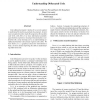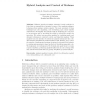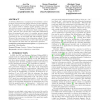81 search results - page 7 / 17 » On the (Im)possibility of Obfuscating Programs |
107
click to vote
IWPC
2006
IEEE
15 years 8 months ago
2006
IEEE
Code obfuscation makes it harder for a security analyst to understand the malicious payload of a program. In most cases an analyst needs to study the program at the machine code l...
132
click to vote
RAID
2010
Springer
15 years 10 days ago
2010
Springer
Abstract. Malware attacks necessitate extensive forensic analysis efforts that are manual-labor intensive because of the analysis-resistance techniques that malware authors employ....
168
click to vote
POST
2012
13 years 9 months ago
2012
Provenance is an increasing concern due to the revolution in sharing and processing scientific data on the Web and in other computer systems. It is proposed that many computer sys...
139
click to vote
SP
2005
IEEE
15 years 7 months ago
2005
IEEE
A malware detector is a system that attempts to determine whether a program has malicious intent. In order to evade detection, malware writers (hackers) frequently use obfuscation...
148
click to vote
DRM
2005
Springer
15 years 7 months ago
2005
Springer
A software obfuscator is a program O to transform a source program P for protection against malicious reverse engineering. O should be correct (O(P) has same functionality with P)...



